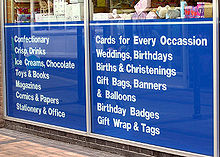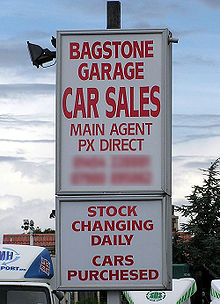- Spelling
-
Part of a series on Reading 
LANGUAGE Language · Writing
Writing system · Orthography
BrailleTYPES OF READING Close reading · Slow reading
Speed reading · SubvocalizationLEARNING TO READ Learning to read
Comprehension
Spelling · Vocabulary
Reading disability · DyslexiaREADING INSTRUCTION Alphabetic principle · Phonics LITERACY Literacy · Functional illiteracy
Family literacy
English orthographyLISTS Languages by writing system
Management of dyslexiaSpelling is the writing of one or more words with letters and diacritics. In addition, the term often, but not always, means an accepted standard spelling or the process of naming the letters.[1][2][3] In the sense of a standard, spelling is one of the elements of orthography and a prescriptive element of alphabetic languages.
Spellings attempt to transcribe the sounds of the language into alphabetic letters, but phonetic spellings are exceptions in many languages for several reasons. Pronunciation changes over time in all languages, and spelling reforms are irregular in most languages and rare in some. In addition, words from other languages may be adopted without being adapted to the spelling system, non-standard spellings are often adopted after extensive common usage, and different meanings of a word or homophones may be deliberately spelled in different ways to differentiate them visually.
Contents
Spelling standards and conventions
Whereas uniformity in the spelling of words is one of the features of a standard language in modern times, and official languages usually prescribe standard spelling, minority languages and regional languages often lack this trait. Furthermore, it is a relatively recent development in various major languages in national contexts, linked to the compiling of dictionaries, the founding of national academies and other institutions of language maintenance, including compulsory mass education.[citation needed]
In countries such as the US and UK without official spelling policies, many vestigial and foreign spelling conventions work simultaneously. In countries where there is a national language maintenance policy, such as France, the Netherlands, and Germany, reforms were driven to make spelling a better index of pronunciation.[citation needed] Spelling often evolves for simple reasons of alphabetic thrift, as when British English "catalogue" becomes American English "catalog".
Furthermore, English (in particular) has absorbed into common usage and dictionary acceptance huge numbers of words from foreign languages, particularly French. These may now have a spelling as in the original form or may be somewhat altered in the transition into English. In many respects, a general principle could be stated that retaining the original spelling is important since it reflects the origin of a word and hence adds an extra nuance to its meaning.[citation needed]
Methods used to teach and learn spelling
Learning proper spelling by rote is a traditional element of elementary education. In the US, the ubiquity of the phonics method of teaching reading, which emphasizes the importance of "sounding out" spelling in learning to read, also puts a premium on the prescriptive learning of spelling. For these reasons, divergence from standard spelling is often perceived as an indicator of low intelligence, illiteracy, or lower class standing. The intelligence of Dan Quayle, for instance, was repeatedly disparaged for his correcting a student's spelling of "potato" as the now non-standard "potatoe" at an elementary school spelling bee in Trenton, New Jersey on June 15, 1992.[4]
The opposite viewpoint was voiced by President Andrew Jackson who stated "It's a damn poor mind that can only think of one way to spell a word."[5]
Since traditional language teaching methods emphasize written language over spoken language, a second-language speaker may have a better spelling ability than a native speaker despite having a poorer command of the language.
Spelling tests are a commonly used assessment in education that are usually used to assess a student's mastery over the words in the spelling lessons the student has received so far. They can also be an effective practice method. There are many free spelling tests on websites on the Internet.
Spelling bees are competitions to determine the best speller of a group. Prominent spelling bees are even televised, such as the National Spelling Bee in the United States.
Divergent spelling
Divergent spelling is a popular advertising technique, used to attract attention or to render a trademark "suggestive" rather than "merely descriptive." The pastry chains Dunkin' Donuts and Krispy Kreme, for example, employ non-standard spellings. KOA Kampground is another example. The same technique is also popular among some recording artists.
Misspellings
 Misspellings of "Occasion" as "Occassion" and "Confectionery" as "Confectionary" on a shopfront in the United Kingdom.
Misspellings of "Occasion" as "Occassion" and "Confectionery" as "Confectionary" on a shopfront in the United Kingdom.
While some words admit multiple spellings, some spellings are not considered standard, and thus labeled as misspellings. A misspelled word can be a series of letters that represents no correctly spelled word of the same language at all (such as "liek" for "like") or a correct spelling of another word (such as writing "here" when one means "hear," or "no" when one means "know"). Misspellings of the latter type can easily make their way into printed material because they are not caught by simple computerized spell checkers.
Misspellings may be due to either typing errors (e.g. the transposition error teh for the), or lack of knowledge of the correct spelling. Whether or not a word is misspelled may depend on context, as is the case with American / British English distinctions. Misspelling can also be a matter of opinion when variant spellings are accepted by some and not by others. For example "miniscule" (for "minuscule") is a misspelling to many,[6] and yet it is listed as an acceptable variant in some dictionaries.[7][8]
A well-known Internet scam involves the registration of domain names that are deliberate misspellings of well-known corporate names in order to mislead or defraud. The practice is commonly known as "typosquatting".[9]
Notable English misspellings
- Cleveland, Ohio – the leader of the crew that surveyed the town's territory was General Moses Cleaveland, and the region was named in his honor; reportedly the town's first newspaper, the Cleveland Advertiser, could not fit the town's name in its masthead without removing the first "a" from the name.[10]
- Google – accidental misspelling of googol.[11] According to Google's vice president, as quoted on a BBC The Money Programme documentary, January 2006, the founders – noted for their poor spelling – registered Google as a trademark and web address before someone pointed out that it was not correct.
- Ovaltine, a popular bedtime drink in the UK and Australia, came about because someone misspelled the original name Ovomaltine on the trademark documentation.[citation needed]
- Referer – common misspelling of the word referrer. It is so common, in fact, that it made it into the official specification of HTTP – the communication protocol of the World Wide Web – and has, therefore, become the standard industry spelling when discussing HTTP referers.[12]
- Sequim, Washington – "In 1879 the first post office was built and named 'Seguin' for the surrounding area. [...] In 1907, due to a Postal Official's error in reading an official report, the post office was titled 'Seguim' for approximately a month. With the next report, the Official read the letter 'g' as a 'q' and the post office here became known as 'Sequim.' The name change apparently did not worry the residents enough to protest. It has been known as Sequim ever since."[13]
- According to some, the name of Quartzsite, a mining town in Arizona was spelled wrongly. It should be Quartzite, after the mineral quartzite.[14]
- Zenith – Arabic zamt was misread; in Latin letters, at the time, the letter i was never dotted, so "m" looked like "ni".[15]
- Arab, Alabama – This town in north Alabama was named Arad, after its founder Arad Thompson, but the name was misspelled on a US Post Office map as "Arab," and the misspelled name stuck.
See also
- Orthography
- Phonetic spelling
- Pronunciation spelling
- Spell checker
- English spelling
- Frequently misused words
-
Lists of common misspellings
- Other languages
-
List of language orthographies
- List of languages by writing system
- French orthography
References
- ^ oxforddictionaries.com
- ^ education.yahoo.com
- ^ merriam-webster.com
- ^ 1992: Gaffe with an 'e' at the end, by Paul Mickle / The Trentonian
- ^ A saying commonly attributed to Andrew Jackson, but there is an alternate version: "It's a damn poor mind, indeed, which can't think of at least two ways to spell a word." Biographer Robert Remini (The Life of Andrew Jackson, 1988) reported that Jackson sometimes wrote "a single word or name four different ways on the same page." Retrieved 28 March 2011 from: jrank.org
- ^ "miniscule", Merriam Webster's Online Dictionary; states that this spelling is "widely regarded as an error"
- ^ "miniscule", The American Heritage Dictionary of the English Language
- ^ "miniscule", Cambridge Dictionary of American English
- ^ "Typosquatters Act May Apply to Misspelling Domain Names to Mislead Surfers", Shari Claire Lewis, New York Law Journal, September 15, 2004
- ^ Ohio, p. 138, Victoria Sherrow, Marshall Cavendish, 2008
- ^ QI: Quite Interesting facts about 100, telegraph.co.uk
- ^ referer – Definitions from Dictionary.com
- ^ Robinson, J. (2005). "Sequim History". City of Sequim, Washington. http://www.ci.sequim.wa.us/planning/ParksPlan/AppendexC.pdf. Retrieved July 24, 2008.
- ^ Town of Quartzsite 2003 General Plan
- ^ Norbury, J. K. W. Word Formation in the Noun and Adjective.
Further reading
- Henry ML, Beeson PM, Stark AJ, Rapcsak SZ (January 2007). "The role of left perisylvian cortical regions in spelling". Brain Lang 100 (1): 44–52. doi:10.1016/j.bandl.2006.06.011. PMC 2362101. PMID 16890279. http://www.pubmedcentral.nih.gov/articlerender.fcgi?tool=pmcentrez&artid=2362101.
- Beeson PM (2004). "Remediation of written language". Top Stroke Rehabil 11 (1): 37–48. doi:10.1310/D4AM-XY9Y-QDFT-YUR0. PMID 14872398. http://thomasland.metapress.com/content/d4amxy9yqdftyur0/?p=653f80ab0e4e4123b3d039e56fa5cd14&o=0.
External links
- Spell checkers
- Spellchecker.net, an online spell checker
- Spellometer, measures frequency of common errors on websites
- Misspellings
- Dumbtionary.com - Dictionary of misspelled words.
Categories:
Wikimedia Foundation. 2010.


